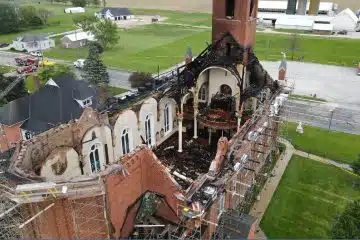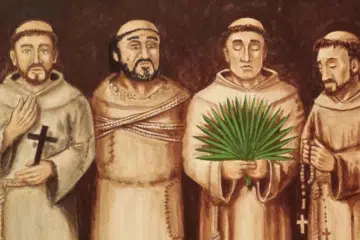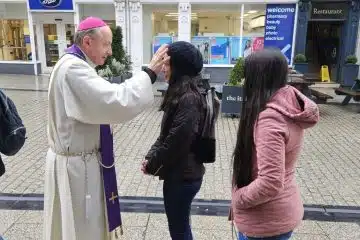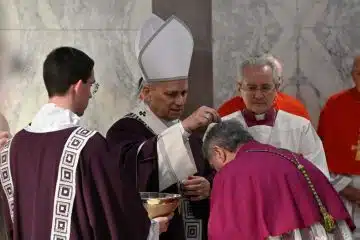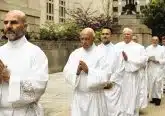The Physician’s Prayer

 For Dr. Daniel Fagel, true healing begins where modern medicine intersects timeless Catholic values. Next May, after more than three decades as a leading gastroenterologist at Tri-
For Dr. Daniel Fagel, true healing begins where modern medicine intersects timeless Catholic values. Next May, after more than three decades as a leading gastroenterologist at Tri-
State Gastroenterology, Dr. Fagel is retiring, but he leaves a blueprint for medical professionals to view their careers less as a job than a vocation—a ministry rooted in love, dignity, and service.
A cradle Catholic raised in Cincinnati’s Mt. Washington neighborhood, Dr. Fagel’s early curiosity and commitment shaped his path. “I was always a straight science guy,” he recalled. “Biology, organic chemistry— that was my world.” The valedictorian for his1981 Xavier University graduating class, he earned his medical degree from the University of Cincinnati in 1985.
It was Xavier that required him to take theology and philosophy courses, which began to open his heart in unexpected ways. “At the time, I thought of those classes as things to get out of the way,” he said with a smile. “But they ended up changing my life—especially Sister Mary Ruth Graf’s biblical studies course. I’ve always been an Old Testament guy, and that foundation in Scripture introduced me to the idea of selflessness.”
By the time he joined Tri-State Gastroenterology in 1991, his reputation as a skilled and compassionate physician was established. It was only years later, however, after joining a Cursillo retreat, that Dr. Fagel experienced a profound spiritual awakening that truly changed how he practiced medicine.
The Cursillo movement, a Catholic discipleship model rooted in the three pillars of piety, study, and action, redefined his understanding of vocation. “Before Cursillo, I kept my faith and my medical practice separate. I believed in the whole ‘separation of church and state’ idea,” he said. “But after that weekend, I was on fire. People came into my practice to talk about GI issues, and I wanted to talk about the Holy Spirit. I realized you can’t keep these parts of yourself separate.”
From then on, Dr. Fagel began every day praying, “Help me, God, be the doctor I need to be for this patient.” He found himself more attuned to his patient’s spiritual needs. When treating patients with liver disease, he encouraged attendance at both Alcoholics Anonymous and a church, as he understood that healing often requires both physical and spiritual restoration.
Cursillo also gave Dr. Fagel a community to help sustain his own faith. Weekly men’s prayer gatherings, often in a local bar on Saturday mornings, became a source of strength and accountability. He attended silent retreats each January, prayed the Rosary on his daily bike ride to work, and found joy in singing with his church choir. “Faith is like breathing,” he said. “And you can’t do it alone. You need the help of others to stay on fire.”
For Dr. Fagel, the connection between Catholic social teaching and the practice of medicine was undeniable. “I believe in the dignity of the human person,” he said. “Your background, your social status—it doesn’t matter. Everyone deserves to be treated with compassion. That’s what the corporal works of mercy look like in a medical practice.” He also made a quiet but powerful faith statement in his everyday work. At the end of biopsy reports, he signed off with “De Colores”—the traditional Cursillo greeting that celebrates the vibrancy of a life lived in Christ.
Looking back, Dr. Fagel knows he followed the path God laid out for him. His late wife, Renee, three sons, and four grandchildren have all been part of that journey. “When I was young, my dad told me I was going to be a doctor,” he said. “And honestly, I have the best job in the world. I get to help people feel better. That’s incredibly fulfilling.”
As he enters retirement, Dr. Fagel isn’t slowing down spiritually. “I never get tired of hearing witness stories—how people’s lives were empty until they found faith. That honest transformation is so powerful,” he says. “We’re all busy, but the question is: with what? Make time for the things that keep your soul alive.”
Dr. Daniel Fagel’s legacy proves that caring for the body can also nourish the soul. “No patient ever said no when I asked if I could pray for them,” he said, reminding us that compassion, dignity, and evangelization are possible in every human interaction. ✣
For information on Cursillo, click here.
This article appeared in the November 2025 edition of The Catholic Telegraph Magazine. For your complimentary subscription, click here.


